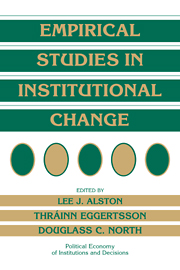Book contents
- Frontmatter
- Contents
- List of contributors
- Series editors' preface
- Acknowledgments
- Introduction
- A note on the economics of institutions
- Empirical work in institutional economics: an overview
- 1 Toward an understanding of property rights
- Economic variables and the development of the law: the case of western mineral rights
- 2 Impediments to institutional change in the former Soviet system
- Why economic reforms fail in the Soviet system: a property rights–based approach
- 3 Transaction costs and economic development
- Public institutions and private transactions: a comparative analysis of the legal and regulatory environment for business transactions in Brazil and Chile
- 4 The evolution of modern institutions of growth
- Constitutions and commitment: the evolution of institutions governing public choice in seventeenth-century England
- 5 Regulation in a dynamic setting
- The political economy of controls: American sugar
- 6 Price controls, property rights, and institutional change
- Roofs or stars: the stated intents and actual effects of a rents ordinance
- 7 Regulating natural resources: the evolution of perverse property rights
- Legally induced technical regress in the Washington salmon fishery
- 8 The politics of institutional change in a representative democracy
- A political theory of the origin of property rights: airport slots
- 9 The economics and politics of institutional change
- Paternalism in agricultural labor contracts in the U.S. South: implications for the growth of the welfare state
- Epilogue: economic performance through time
- Author index
- Subject index
- POLITICAL ECONOMY OF INSTITUTIONS AND DECISIONS
Public institutions and private transactions: a comparative analysis of the legal and regulatory environment for business transactions in Brazil and Chile
Published online by Cambridge University Press: 05 June 2012
- Frontmatter
- Contents
- List of contributors
- Series editors' preface
- Acknowledgments
- Introduction
- A note on the economics of institutions
- Empirical work in institutional economics: an overview
- 1 Toward an understanding of property rights
- Economic variables and the development of the law: the case of western mineral rights
- 2 Impediments to institutional change in the former Soviet system
- Why economic reforms fail in the Soviet system: a property rights–based approach
- 3 Transaction costs and economic development
- Public institutions and private transactions: a comparative analysis of the legal and regulatory environment for business transactions in Brazil and Chile
- 4 The evolution of modern institutions of growth
- Constitutions and commitment: the evolution of institutions governing public choice in seventeenth-century England
- 5 Regulation in a dynamic setting
- The political economy of controls: American sugar
- 6 Price controls, property rights, and institutional change
- Roofs or stars: the stated intents and actual effects of a rents ordinance
- 7 Regulating natural resources: the evolution of perverse property rights
- Legally induced technical regress in the Washington salmon fishery
- 8 The politics of institutional change in a representative democracy
- A political theory of the origin of property rights: airport slots
- 9 The economics and politics of institutional change
- Paternalism in agricultural labor contracts in the U.S. South: implications for the growth of the welfare state
- Epilogue: economic performance through time
- Author index
- Subject index
- POLITICAL ECONOMY OF INSTITUTIONS AND DECISIONS
Summary
INTRODUCTION
How do complex, nontransparent laws and regulations and a somewhat inaccessible, expensive, and slow set of formal legal conflict resolution mechanisms affect business transactions? This study uses the approach of the new institutional economics (NIE) to contrast the impact of the complex legal and regulatory environment in Brazil with that in Chile, where regulatory and legal reforms have sought to facilitate market efficiency. In addition, the study examines the importance of legal and regulatory obstacles to the growth and operation of Brazilian businesses relative to other constraints. The results illustrate a central point: institutions matter economically in the actual costs (and benefits) they create for businesses, not in their compliance with ideal forms.
The study examines four basic areas where legal and regulatory institutions could create critical obstacles to efficiency:
the start-up of a new business (entry);
the regulation of business;
orders by customers; and
sales with credit.
The first two areas involve transactions between a business and the government, while the second two involve transactions between businesses. Interviews with garment firms were used to ascertain in as quantitative a way as possible the costs and problems associated with particular transactions.
The results show that Chilean business transactions indeed benefit from legal simplicity and consistency of enforcement relative to their Brazilian counterparts, but these benefits are mitigated by the differences between formal law and the law in practice in Brazil.
- Type
- Chapter
- Information
- Empirical Studies in Institutional Change , pp. 95 - 128Publisher: Cambridge University PressPrint publication year: 1996
- 30
- Cited by

